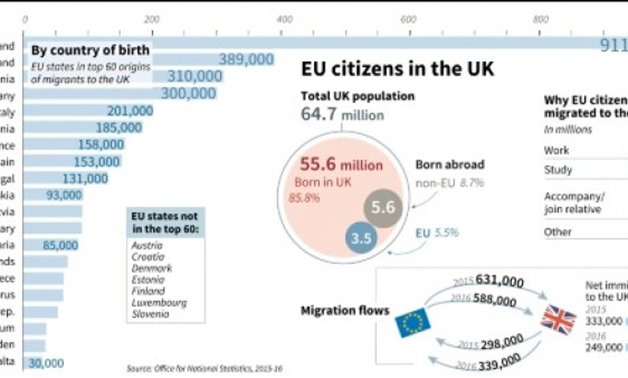
© AFP | The rights of EU citizens in Britain will be "enshrined in UK law and enforced by British courts", May said
LONDON - 8 December 2017: After Britain and the European Union reached a historic deal on Friday on the terms of the Brexit divorce, here is an outline of what we know so far about the UK's departure:
- Timing -
Following Britain's vote to leave the European Union in a June 2016 referendum, the country is officially scheduled to break off on March 29, 2019.
Negotiations with Brussels began in June, with three key issues -- the financial settlement, EU citizens' rights and the Irish border -- to be settled before talks could move on to the future trade relationship between the two parties.
After several months of wrangling, the European Commission said on Friday it "recommends sufficient progress" had been made although approval is still needed from a summit of EU leaders next week.
- Transition period -
In a speech in Florence, May said Britain would seek a time-limited "implementation period" after Brexit to give businesses time to adapt.
The transition period would last "around two years", although this loose phrasing has caused divisions in the British cabinet.
May has said Britain intends to leave the European single market in order to end the free movement of people from the continent.
Free movement could continue during the transition period, although EU citizens would have to register on arrival in Britain.
- Brexit bill -
May said in Florence that Britain would honour commitments made during its membership up until the end of the current budget cycle in 2020.
Brussels announced last month that Britain was "very close" to an agreement on the bill, with reports that the settlement could be up to 55 billion euros.
But a senior British source told the Press Association news agency on Friday it would be between 40 and 45 billion euros.
- Rights of EU, UK citizens -
The status of more than three million Europeans living in Britain, and more than one million British expatriates, is a key issue for both sides.
Following Friday's agreement, May said the rights of EU citizens in Britain would be "enshrined in UK law and enforced by British courts".
British citizens living in the EU will also retain their rights.
In the passage which may cause the most anger among Brexiteers, Britain agreed that its courts will be able to refer issues about EU citizens' rights to the European Court of Justice for eight years after leaving the European Union.
- No hard border with Ireland -
The deal guarantees the "avoidance of a hard border" between EU member Ireland and British-ruled Northern Ireland, a key issue in maintaining peace in the province.
Dublin and London had appeared to reach a deal, with the British government apparently ready to allow Northern Ireland to remain aligned with EU customs and single market rules.
But the deal was torpedoed by Northern Ireland's DUP, the pro-British party that props up May's government in Westminster, who demanded that there be no regulatory divergence between Northern Ireland and the British mainland.
After days of talks, an agreement was reached after Britain vowed to find a way to avoid a hard border "through the overall EU-UK relationship".
However, if this cannot be achieved, Britain will keep "full alignment" with EU single market and customs union rules that "support North-South cooperation".
This raises the spectre that the whole of Britain could be bound by EU regulations unless it finds a way of maintaining a frictionless border.
- What happens next? -
An EU summit on December 14-15 is set to formally give the go-ahead for the beginning of negotiations on a transition period and the future partnership between the UK and the EU.
Britain has said it is confident of wrapping up both sets of negotiations -- withdrawal and future trade ties -- by the time it leaves the EU but many others have warned the negotiations could take years.
May has ruled out staying in the EU's customs union so that Britain can strike its own trade deals with countries outside the bloc.
EU lead negotiator Michel Barnier says the withdrawal negotiations must be wrapped up by October 2018 to give the European Parliament time to ratify any deal.
May has promised the British parliament a vote on the final Brexit deal but warned that rejecting it meant Britain would leave without any agreement.
Before then, she must push eight bills relating to Brexit through the House of Commons.
MPs are currently scrutinising the first bill, which will repeal Britain's EU membership and transfer four decades of European law onto the UK statute books.
burs-jwp/dt/ser


Comments
Leave a Comment